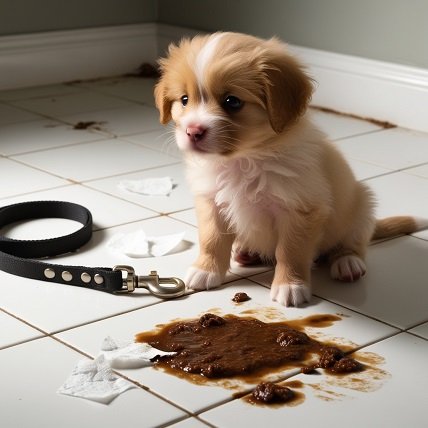Introduction
Though their sensitive systems might occasionally be prone to problems like diarrhea, puppies are incredibly cute. Seeing their pet suffer an upset stomach can be frightening and perplexing for many first-time pet owners. For the sake of the puppies’ health and welfare, it is essential to comprehend the causes, remedies, and avoidance of Puppy Has Diarrhea. This comprehensive resource offers comprehensive advice on managing diarrhea in puppies, encompassing everything from possible causes to practical solutions.
Comprehending Diarrhea in Puppies
Puppies that have diarrhea sometimes have loose, watery, or frequent feces, which may be a sign of digestive system problems. Puppies’ growing immune systems and digestive tracts make them more prone to gastrointestinal problems and have more sensitive stomachs than older canines.
Common Reasons for Puppies’ Diarrhea
Diarrhea in puppies can be caused by various factors such as illnesses, food intolerances, and dietary modifications. A puppy’s stomach may become upset by sudden dietary changes, which may result in diarrhea as their digestive system adjusts. Gastrointestinal distress can also result from food allergies or intolerances to particular components.
Determining the Diarrheal Severity
Puppies’ diarrhea can range in severity from moderate and sporadic to severe and chronic. Examine your puppy’s stools for consistency and frequency, and note any concomitant symptoms like vomiting or lethargy to determine the severity. While mild cases of diarrhea may go away on their own with no help, severe or ongoing cases may indicate a more significant medical problem.
When to See a Veterinary Professional
When treating puppy diarrhea, seeing a veterinarian is essential, particularly if the illness does not get better in 24 to 48 hours. If your puppy has bloody, black, tarry feces in addition to diarrhea, or if they exhibit symptoms of dehydration including excessive thirst, lethargic behavior, or a dry nose, they need to see a veterinarian very away.
Home Treatments for Moderate Diarrhea
There are a few natural therapies that can help with minor episodes of diarrhea. Give your dog a 12- to 24-hour fast to give their digestive system a chance to relax and heal. Following the fasting period, returning their digestive tract to normal can be facilitated by introducing a bland meal of rice and boiling chicken.
The Value of Hydration
It’s important to keep your puppy hydrated when they have diarrhea since dehydration can happen very rapidly. Make sure your dog has access to clean, fresh water at all times, and think about giving them an electrolyte solution made especially for pets to help replenish lost fluids and minerals.
Preventive Actions
Puppy Has Diarrhea can be avoided by taking a number of preventive measures to reduce the risk. Modest dietary adjustments can help prevent upset stomachs, and routine deworming can help prevent parasite infections that can lead to gastrointestinal problems. It’s also essential to puppy-proof your house to keep poisonous materials and dangerous plants out of reach.
Procedures for Diagnosis
In order to identify the underlying cause of diarrhea that doesn’t go away despite home care attempts, diagnostic tests could be required. Blood tests reveal general health and possible systemic problems, while fecal examinations can detect parasites or bacterial diseases.
Conclusion
Puppy Has Diarrhea management include determining the source, assessing the severity, and taking the necessary steps to protect your puppy’s health. In order to address underlying problems and avoid consequences, severe or persistent diarrhea requires veterinarian care, but minor instances may be treated at home with preventive measures and medicines.
FAQ
How long before a Puppy Has Diarrhea becomes a severe problem?
It’s crucial to see a veterinarian if the Puppy Has Diarrhea lasts longer than 24 to 48 hours or if it’s followed by other symptoms like vomiting, lethargy, or blood in the stool. In addition to causing dehydration, persistent diarrhea may indicate a more serious medical problem.
Can diarrhea be caused by a change in Puppy Has Diarrhea food?
It is true that abrupt dietary changes can cause upset stomachs in puppies and cause diarrhea. It is advisable to gradually introduce new meals to your puppy’s diet, blending them with the old food over a few days to give their digestive system time to acclimate.
What symptoms may a puppy exhibit Puppy Has Diarrhea?
Puppy Has Diarrhea who exhibit excessive thirst, dry gums, lethargy, and skin that stays tense when pinched are symptoms of dehydration. Make sure your puppy has access to fresh water if you think they may be dehydrated, and follow your veterinarian’s advice and use an electrolyte solution for pets.

